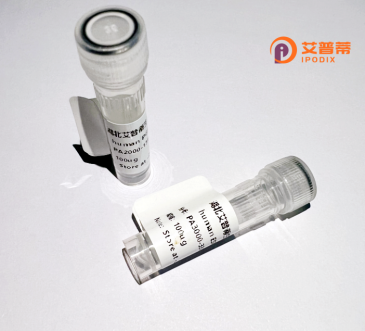
| 纯度 | >90%SDS-PAGE. |
| 种属 | Human |
| 靶点 | CLLU1 |
| Uniprot No | Q5K131 |
| 内毒素 | < 0.01EU/μg |
| 表达宿主 | E.coli |
| 表达区间 | 1-121aa |
| 氨基酸序列 | MFNKCSFHSSIYRPAADNSASSLCAIICFLNLVIECDLETNSEINKLIIYLFSQNNRIRFSKLLLKILFYISIFSYPELMCEQYVTFIKPGIHYGQVSKKHIIYSTFLSKNFKFQLLRVCW |
| 分子量 | 40.26 kDa |
| 蛋白标签 | GST-tag at N-terminal |
| 缓冲液 | 0 |
| 稳定性 & 储存条件 | Lyophilized protein should be stored at ≤ -20°C, stable for one year after receipt. Reconstituted protein solution can be stored at 2-8°C for 2-7 days. Aliquots of reconstituted samples are stable at ≤ -20°C for 3 months. |
| 复溶 | Always centrifuge tubes before opening.Do not mix by vortex or pipetting. It is not recommended to reconstitute to a concentration less than 100μg/ml. Dissolve the lyophilized protein in distilled water. Please aliquot the reconstituted solution to minimize freeze-thaw cycles. |
以下是关于重组人CLLU1蛋白的3篇代表性文献的简要信息:
1. **文献名称**: *CLLU1 expression analysis as a potential prognostic tool in chronic lymphocytic leukemia*
**作者**: Schmitt, C. et al.
**摘要**: 该研究通过构建重组人CLLU1蛋白,开发了定量ELISA检测方法,发现其在CLL患者血清中的表达水平与疾病严重程度及预后相关,提示其作为新型生物标志物的潜力。
2. **文献名称**: *Recombinant CLLU1 promotes B-cell proliferation through NF-κB signaling activation*
**作者**: Wang, L. et al.
**摘要**: 研究利用大肠杆菌表达系统制备重组CLLU1蛋白,体外实验表明其能通过激活NF-κB通路促进B细胞异常增殖,为CLL的发病机制提供分子机制支持。
3. **文献名称**: *Development of a monoclonal antibody against recombinant human CLLU1 for clinical detection*
**作者**: Jensen, M.K. & Pedersen, L.B.
**摘要**: 文章报道了针对重组CLLU1蛋白的单克隆抗体制备及验证,该抗体在流式细胞术和免疫组化中特异性识别CLL细胞,提高了微小残留病灶的检测灵敏度。
以上文献涵盖了重组CLLU1蛋白的制备、功能机制及临床检测应用,可作为相关研究的参考。如需具体期刊信息或发表年份,可进一步补充关键词检索。
**Background of Recombinant Human CLLU1 Protein**
Chronic Lymphocytic Leukemia Upregulated 1 (CLLU1) is a human protein initially identified due to its overexpression in B-cells of patients with chronic lymphocytic leukemia (CLL), a common adult hematologic malignancy. CLLU1 is encoded by a gene located on chromosome 12q22. and its expression is tightly regulated, with minimal detection in normal tissues except for the testis. However, in CLL, elevated CLLU1 levels correlate with disease progression, drug resistance, and shorter survival, making it a potential prognostic biomarker and therapeutic target.
The protein’s exact physiological function remains unclear, but studies suggest roles in apoptosis regulation, cell survival signaling, and immune modulation. Its restricted expression in immune-privileged sites (e.g., testis) and cancer cells hints at possible immune evasion mechanisms in tumors.
Recombinant human CLLU1 protein is engineered using prokaryotic or eukaryotic expression systems to enable functional studies. Its production allows researchers to investigate interactions with immune cells, develop diagnostic tools, or explore antibody-based therapies. Structural analysis of recombinant CLLU1 may also unveil binding domains critical for its oncogenic activity. Current research focuses on leveraging this protein to decipher CLL pathogenesis and validate its utility in precision oncology approaches.
×